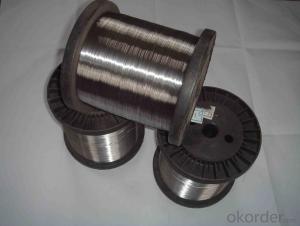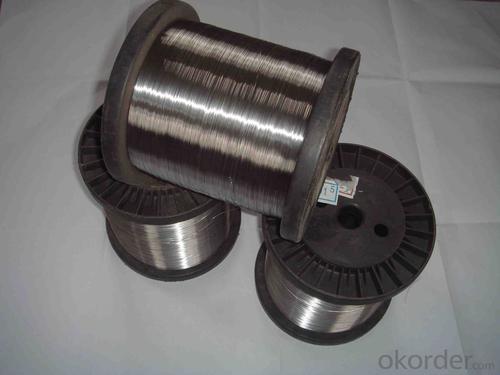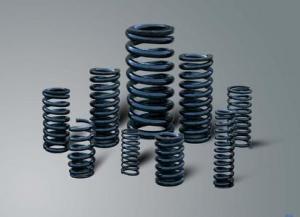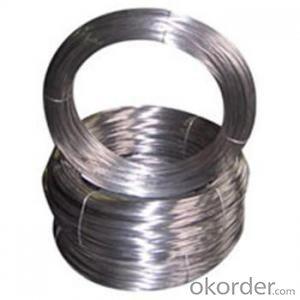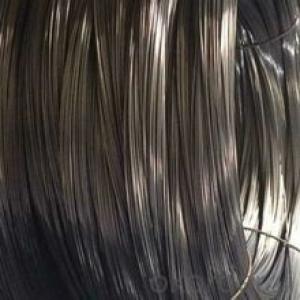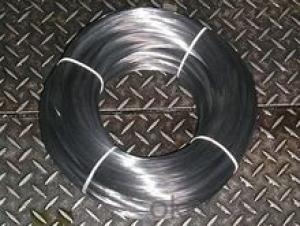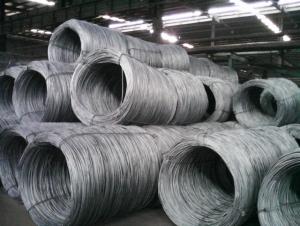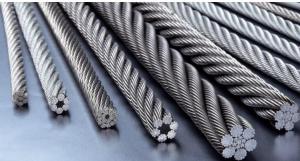Steel Spring Wire Hot Sale and High Quality
- Loading Port:
- Shanghai
- Payment Terms:
- TT OR LC
- Min Order Qty:
- 2000 kg
- Supply Capability:
- 10000 kg/month
OKorder Service Pledge
OKorder Financial Service
You Might Also Like
1.Packing And Delivery
Package: Seaworthy package
MOQ: 0.5 tons
Delivery: 15-20 days
Monthly Output: 100 tons
Payment : 30%T/T in advanced+70% balanced;irrevocable L/C at sight
Remarks: All-risk insurance and accept the third party test
Port : Shanghai
AISI 316 high tensile strength stainless steel spring wire
| Detail as follows: | |
| Standard | AISI,ASTM,GB,SUS etc |
| Grade | 201,202,204,301,303,304,304L,310,316,316L etc |
| Diameter | 0.7mm-14.0mm |
| Surface | Bright or matt |
| Condition | hard |
| Tolerance | +/-0.03mm |
| Length | According to customers’ requirement |
| Packing | Packed by weaved bag or according to customer's requirements |
| Technology | Cold drawn |
| Application | Spring |
| Productivity | 300 tons/month |
| MOQ | 100KG |
| Note | We can produce other standard as the customers' requirement |
1. Competitive price and quality from our own factory
2. Approved by ISO9001, CE, SGS every year
3. Best service with 24 hour`s reply
4. Flexible payment with T/T,L/C , paypal, kunlun bank, western union, etc.
5. Smooth production ability(50000tons/month)
6. Quick delivery and standard exporting package
7. OEM/ODM
- Q: How are steel pipes used in mining?
- Steel pipes are widely used in mining operations for various purposes. One of the primary uses of steel pipes in mining is for transporting materials such as water, slurry, and other liquids. These pipes are durable and can withstand the harsh conditions often found in mining environments, making them suitable for the transportation of materials over long distances. Steel pipes are also used for ventilation systems in mines. Proper ventilation is crucial in mining to provide fresh air to workers and remove harmful gases and dust. Steel pipes are used to construct ventilation shafts and ducts that facilitate the flow of air throughout the mine, ensuring a safe working environment for the miners. Additionally, steel pipes are used in the construction of underground tunnels and mine shafts. These pipes provide structural support and reinforcement, helping to prevent collapses and maintain the stability of the mine. Steel pipes are known for their strength and durability, making them an ideal choice for these critical applications in mining. Another application of steel pipes in mining is for the extraction of resources. In some cases, steel pipes are used to create boreholes or wells to access underground deposits of minerals or water. These pipes are inserted into the ground, and various techniques such as drilling or hydraulic fracturing are used to extract the desired resources. Overall, steel pipes play a vital role in the mining industry, serving various purposes such as material transportation, ventilation, structural support, and resource extraction. Their strength, durability, and ability to withstand harsh conditions make them indispensable in mining operations.
- Q: Are steel pipes suitable for underground mining operations?
- Yes, steel pipes are suitable for underground mining operations. Steel pipes are known for their durability, strength, and resistance to corrosion, making them ideal for use in harsh underground mining environments. They can withstand high pressure and are capable of transporting various substances, such as water, air, or mining materials, with reliability and efficiency. Additionally, steel pipes can be customized to meet specific mining requirements, ensuring their suitability for underground operations.
- Q: Can steel pipes be used for conveying steam?
- Yes, steel pipes can be used for conveying steam. Steel pipes are commonly used in steam systems due to their high strength and durability, as well as their ability to withstand high temperature and pressure conditions. However, it is important to ensure that the steel pipes are properly insulated and the system is adequately designed to prevent any potential issues such as corrosion or thermal expansion.
- Q: Can steel pipes be used for underground water supply?
- Yes, steel pipes can be used for underground water supply. Steel pipes are strong, durable, and resistant to corrosion, making them suitable for various applications, including underground water supply. However, it is important to use steel pipes that are specifically designed for underground use and are coated or lined to prevent corrosion. Additionally, proper installation and maintenance are crucial to ensure the long-term integrity and functionality of the steel pipes in an underground water supply system.
- Q: How are steel pipes used in the manufacturing of furniture and appliances?
- Steel pipes are commonly used in the manufacturing of furniture and appliances due to their strength, durability, and versatility. One of the main uses of steel pipes in furniture manufacturing is for constructing the frames or structures of various pieces, such as chairs, tables, and beds. These pipes are often used as the primary support system, providing a sturdy and reliable foundation for the furniture. In appliances, steel pipes are utilized for various purposes. They are commonly employed in the manufacturing of kitchen appliances, such as stoves, ovens, and refrigerators, to create the internal framework and support the weight of the appliance. Steel pipes are also frequently used in the production of washing machines, dryers, and dishwashers to transport water and other fluids throughout the appliance. Furthermore, steel pipes are utilized in the manufacturing of outdoor furniture and equipment, where weather resistance and durability are crucial. These pipes are often coated with protective materials to prevent rust and corrosion, ensuring the longevity of the furniture and appliances. Overall, steel pipes play a vital role in the manufacturing of furniture and appliances, providing the necessary strength and support required for these items. Their versatility allows for various applications, making them an essential component in the production process of these goods.
- Q: How are steel pipes protected against fire hazards?
- Steel pipes are protected against fire hazards through various methods such as fire-resistant coatings, fire wraps, or fireproof cladding. These protective measures prevent the pipes from being exposed to high temperatures and flames, ensuring their structural integrity and reducing the risk of fire-related incidents.
- Q: Can steel pipes be used for conveying corrosive substances?
- When conveying corrosive substances, it is crucial to select the appropriate type of steel and take additional protective measures. For instance, stainless steel pipes offer excellent resistance to corrosion and can handle a wide range of corrosive substances. However, one must carefully consider the specific corrosive properties and concentration levels of the substance being conveyed. In certain cases, applying additional protective coatings or linings may be necessary to prevent corrosion and guarantee the pipes' durability. Regular maintenance and inspection play a vital role in identifying and addressing any signs of corrosion to avoid leaks or failures in the piping system. In conclusion, while steel pipes are suitable for conveying corrosive substances, proper material selection, protective measures, and maintenance are essential for safe and efficient operations.
- Q: Are steel pipes suitable for underground sewage systems?
- Yes, steel pipes are suitable for underground sewage systems. Steel pipes are known for their strength, durability, and resistance to corrosion, making them an ideal choice for underground installations. Steel pipes can withstand the pressure and weight of the soil above, ensuring the integrity of the sewage system. Additionally, steel pipes have a long lifespan and can withstand extreme temperatures and environmental conditions, making them a reliable choice for underground applications. However, it is important to note that proper coating and insulation should be applied to steel pipes to prevent corrosion and ensure longevity.
- Q: What are the advantages of using steel pipes in marine applications?
- Using steel pipes in marine applications offers several benefits. Firstly, steel pipes possess exceptional durability and a high resistance to corrosion. This is crucial in marine settings where pipes are constantly exposed to saltwater, which can rapidly degrade materials. Steel pipes can withstand these harsh conditions and maintain their structural integrity for extended periods. Another advantage of utilizing steel pipes in marine applications is their strength. Steel is a robust and sturdy material that can endure high pressure and extreme conditions commonly encountered in marine operations. This makes steel pipes ideal for transporting fluids, such as water, oil, and gas, in marine environments. Moreover, steel pipes provide excellent fire resistance. In the event of a fire on a ship or offshore platform, steel pipes act as a reliable fire barrier, preventing the spread of flames and ensuring the safety of personnel and equipment. Furthermore, steel pipes are highly versatile and can be easily fabricated to meet specific requirements. They can be manufactured in various sizes, shapes, and thicknesses, allowing for customization to suit the particular needs of marine applications. Steel pipes can also be easily welded together, creating a seamless and leak-proof system. Lastly, steel pipes prove to be cost-effective in the long run. Although the initial investment may be higher compared to other materials, the durability and longevity of steel pipes make them a cost-efficient choice. With minimal maintenance and a long lifespan, steel pipes reduce the need for frequent replacements, resulting in significant cost savings over time. In conclusion, the advantages of using steel pipes in marine applications include their durability, corrosion resistance, strength, fire resistance, versatility, and cost-effectiveness. These factors make steel pipes a reliable and efficient choice for various marine operations, ensuring the safe and efficient transport of fluids in harsh marine environments.
- Q: What is the difference between steel pipe and PVC conduit?
- Steel pipe and PVC conduit serve distinct purposes and possess unique characteristics. The material composition stands as a primary distinction between steel pipe and PVC conduit. Steel pipe consists of robust and enduring materials, typically carbon steel or stainless steel, rendering it sturdy and resistant to impact. Consequently, it finds its utility in heavy-duty applications such as plumbing or structural support. In contrast, PVC conduit is constructed from polyvinyl chloride, a type of plastic. PVC's lightweight, flexibility, and ease of manipulation make it ideal for electrical purposes like safeguarding and directing electrical wires. Resistance to corrosion represents another disparity between the two. Steel pipe exhibits greater resistance to corrosion than PVC conduit, particularly when fortified with protective layers like zinc or epoxy. This makes steel pipe suitable for outdoor applications, subterranean installations, or environments with high moisture or corrosive elements. PVC conduit, while generally resistant to moisture and chemicals, may deteriorate over time when exposed to sunlight and can be harmed by specific chemicals. Consideration of cost becomes another factor. Steel pipe generally incurs greater expenses than PVC conduit due to its material and manufacturing process. Nonetheless, steel pipe's durability and extended lifespan establish it as a cost-effective selection in the long run, particularly for applications necessitating high strength and longevity. On the contrary, PVC conduit is comparatively inexpensive and readily accessible, rendering it a more affordable choice for numerous electrical projects. Lastly, installation methods differ between the two. Steel pipe is typically connected through threaded connections or welded joints, mandating specialized tools and skills. Conversely, PVC conduit can be effortlessly cut, assembled, and connected using PVC cement or fittings. This renders PVC conduit a more DIY-friendly option for electrical installations. In summary, steel pipe and PVC conduit diverge in terms of material composition, resistance to corrosion, cost, and installation methods. Steel pipe boasts strength, durability, and corrosion resistance, making it suitable for rigorous applications. PVC conduit, conversely, possesses lightness, flexibility, and affordability, rendering it ideal for electrical projects.
Send your message to us
Steel Spring Wire Hot Sale and High Quality
- Loading Port:
- Shanghai
- Payment Terms:
- TT OR LC
- Min Order Qty:
- 2000 kg
- Supply Capability:
- 10000 kg/month
OKorder Service Pledge
OKorder Financial Service
Similar products
Hot products
Hot Searches
Related keywords

